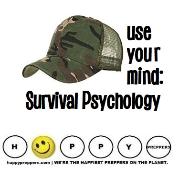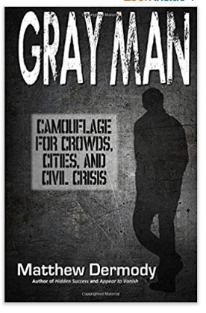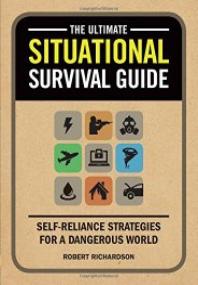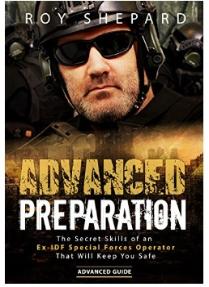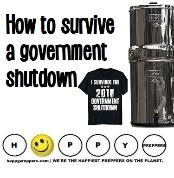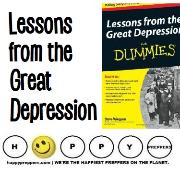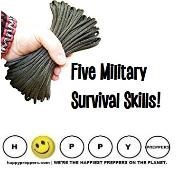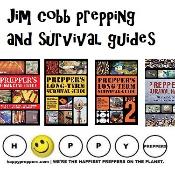------------------------------------------------- Revised 03/10/2021
(C) Copyright 2012-2021 by HappyPreppers.com. All rights reserved. The site happily targets concerned
citizens who are self-reliant survivalists, preppers and homesteaders with original content on survival following
societal collapse. You may link to our site, but you may not reproduce any part of our content, or store our
content in any retrieval system to represent it as your own. Further, you may not transmit content in any other
form or by any means, including (but not limited to) electronic, photocopy, mechanical, or recording without
written consent. HappyPreppers.com makes no warranties.
HappyPreppers.com is a participant in the Amazon Services LLC Associates Program, an affiliate advertising
program designed to provide a means for sites to earn advertising fees by advertising and linking to
amazon.com, amazonsupply.com, or myhabit.com.
Thanks for visiting our survivalists prepping site!
This prepping article on grayman survival has been archved by waybackmachine.org. It's been captured as
many as 39 times between Dec. 5, 2018 and March 3, 2021. This helps protect our copyright.
Do NOT copy. Linking is okay.
sitemap
privacy policy
(C) Copyright 2012-2021 by HappyPreppers.com. All rights reserved. The site happily targets concerned
citizens who are self-reliant survivalists, preppers and homesteaders with original content on survival following
societal collapse. You may link to our site, but you may not reproduce any part of our content, or store our
content in any retrieval system to represent it as your own. Further, you may not transmit content in any other
form or by any means, including (but not limited to) electronic, photocopy, mechanical, or recording without
written consent. HappyPreppers.com makes no warranties.
HappyPreppers.com is a participant in the Amazon Services LLC Associates Program, an affiliate advertising
program designed to provide a means for sites to earn advertising fees by advertising and linking to
amazon.com, amazonsupply.com, or myhabit.com.
Thanks for visiting our survivalists prepping site!
This prepping article on grayman survival has been archved by waybackmachine.org. It's been captured as
many as 39 times between Dec. 5, 2018 and March 3, 2021. This helps protect our copyright.
Do NOT copy. Linking is okay.
sitemap
privacy policy
Prepper Deal Alerts Check
our daily deals for prepping
gear and food storage.
our daily deals for prepping
gear and food storage.
Above, Special Forces Operator and author Roy Shepard discloses how to
think like the gray man. This could be the single-most important part of the
gray man.
Step #5: Ensure Advanced Preparation.
Being prepared to take a split-second decision could save your
life if you have the know how of advanced preparation. In the
important video above Roy Shepard, a prepper who is formerly
from the Israeli Defense Forces, shares the mindset of someone
ready to be the gray man. As he explains it, there are four colors
representing levels of events to give you the advanced
preparation you need as a gray man...
Anyone can be a gray man for a day and this is a good survival
skill to practice. In the book, Anti-tracking, pictured right, the
goal is in maintaining a low profile and evading capture. It's an
intuitive and revealing resource that demystifies the art of
creating the illusion of invisibility. It's also a good lead-in to our
other article on how to disappear.
Happy endings...
Being a gray man is about being boring and avoiding stimulus.
Aim for average! If you're interesting or memorable, you're not
succeeding on the gray man concept. Get out your jeans and T-
shirt and get ready to be a gray man or woman, but go beyond
the gray man concept and have a clear decision making process
in place, so that you're ready to put the grayman strategies and
tactics into play when you need them.
Related articles...
Prepare to live happily ever after with us at happypreppers.com - the emergency
preparedness Web site of prepping, survival, homesteading, and self-reliance.
think like the gray man. This could be the single-most important part of the
gray man.
Step #5: Ensure Advanced Preparation.
Being prepared to take a split-second decision could save your
life if you have the know how of advanced preparation. In the
important video above Roy Shepard, a prepper who is formerly
from the Israeli Defense Forces, shares the mindset of someone
ready to be the gray man. As he explains it, there are four colors
representing levels of events to give you the advanced
preparation you need as a gray man...
- White zone: The white zone is when you are unaware,
preoccupied. Sometimes you may have a distracting text or
phone call. Get out of this situation as quickly as possible
so you can be aware.
- Green zone: Aware of surroundings. This is actively looking
for something that's amiss. For example:
- a UPS driver has a Fed Ex package (seems suspicious)
- It's a hot day and someone is wearing a heaving trench
coat.
- Yellow zone: In this zone you are aware something is out
of place and in this altered state you're taking steps about
what to do. Get the tools in your hand, have a plan for route
of escape, look for barriers or a cover so that in the event
something happens you're able to avoid it.
- Red zone: Danger is when you see a weapon or an active
shooter, you activate your pre-existing plan from the yellow
zone.
Anyone can be a gray man for a day and this is a good survival
skill to practice. In the book, Anti-tracking, pictured right, the
goal is in maintaining a low profile and evading capture. It's an
intuitive and revealing resource that demystifies the art of
creating the illusion of invisibility. It's also a good lead-in to our
other article on how to disappear.
Happy endings...
Being a gray man is about being boring and avoiding stimulus.
Aim for average! If you're interesting or memorable, you're not
succeeding on the gray man concept. Get out your jeans and T-
shirt and get ready to be a gray man or woman, but go beyond
the gray man concept and have a clear decision making process
in place, so that you're ready to put the grayman strategies and
tactics into play when you need them.
Related articles...
- How to prepare for DACA as an undocumented immigrant
- Pack ration bars in your car (not your bugout bag)
- Foods with the best shelf life.
- Weird shelf-stable foods.
- 25 of the Most Overlooked Preps
- 99 Ways to Spend a Buck Prepping the Dollar Stores.
- Bugging out with kids.
- How to do laundry without electricity.
- Best Groceries to Buy on Amazon.
Prepare to live happily ever after with us at happypreppers.com - the emergency
preparedness Web site of prepping, survival, homesteading, and self-reliance.

Above, Antifa rioters in black bloc (dark clothing) effectively send a message
of strength in numbers, but are able to conceal their identities.
Step #3: Integrate (have a baseline movement).
Immerse yourself in the environment so that it looks like you
belong. This means knowing the social norms and following them,
and using intuition and having a baseline movement.
Here's how to move about to avoid conflict.
Step #4: Maintain a situational awareness.
You can eliminate the chance for danger when you know how to
maintain a situational awareness. It's about having a threshold of
information about a situation so you can respond. If something
happens then you can follow through with a plan of action.
of strength in numbers, but are able to conceal their identities.
- Create a non-threatening appearance. While the Antifa
collectively are intimidating in black bloc, and while it's a
good example of effective use of color, it's really the
opposite of what you want to do as a gray man. The gray
man is not just invisible, but also an expert at looking less
tactical or threatening. The demeanor of the gray man is
always non-threatening.
- Don't wear jewelry and watches. If possible avoid wearing
jewelry and hide tattoos because they are identifying
markers. It's just another layer of individuality that could
make you a target of an assault. Jewelry also can make an
impression of your social class or help identify you in a
lineup.
- Hide anything distinguishable. Is your hair extra long? Are
you bald? Do you have bright red hair? Put a cap on it! Have
a bushy beard or distinguishing moustache? Shave it off.
You'll blend in better if you have less distinguishing
features. There's not much you can do about your height,
weight or features like freckles. Control what you can.
Blending in and assimilating is about being forgettable.
Matthew Dermody's Grayman: Camouflage for crowds, cities
and civil crisis, is a book to help you accomplish assimilation
and give you a good foundation for vanishing in any urban
environment in part by avoiding individual expression.
Step #3: Integrate (have a baseline movement).
Immerse yourself in the environment so that it looks like you
belong. This means knowing the social norms and following them,
and using intuition and having a baseline movement.
Here's how to move about to avoid conflict.
- Be boring. The Grayman theory is about never making a first
impression. This concept is an advantage to a homeless
person who wants to undetected to get some free heat or
use the bathroom. He or she will ditch the gear or hide it to
walk undetected into a mall.
- Pay attention to cadence. The modulation or inflection of
your voice is important. Think about how you might behave
in a library for example, which is the polar opposite of how
you'd behave at a sporting event. Do what the crowd is
doing. You may need to keep your voice down.
- Walk with purpose and confidence. Once way to avoid
conflict is to look like as though you know where you're going
(even if you don't). This could mean walking briskly, but it
might mean walking the pace of the crowd. Use your
intuition.
- Avoid sudden movements. Control your movements.
Remain calm and have the body relaxed and not show any
stress. Depending on the situation you may not want any
sudden movement at all. You may need to use reflective
surfaces on the street to watch what's going on around you
instead of looking suspiciously to the left or right.
- Avoid eye contact. When someone connects with you
visually, this eye contact can draw you into their sphere and
you'll make an unwanted impression as a gray man. If this
happens, try brush it off with the wave of a hand so as
though to say, "not today" without opening your mouth.
Another tactic for the gray man is to just look aloof. If you're
engaged in thought or walking with purpose, you can avoid
such unwanted eye contact.
- Minimize interactions with people. If someone asks you for
directions, just tell them that you're late for an appointment
or talk to an imaginary person on your cell phone. When
someone asks you for spare change look preoccupied in
thought. Keep the interaction to a bare minimum.
- Keep a show of hands. The gray man hands should be open
and not in the pockets ~ this is because hands provide
visual clues about a person. When you're not concealing your
hands you're also not holding a weapon. This makes you
appear less threatening and noticeable. When your hands
are relaxed they're also not it a position to strike. This can
build a level of trust in you. However, when you are in an
awareness of danger, this is when your tools are ready.
- Know that smell is a factor. Don't wear perfume or Old Spice
deodorant to trigger an olfactory connection to you ~ smell
of any kind can help form an impression of you. If you're
homeless, for example, excessive body odor can be a
giveaway. If you're nervous you'll perspire more and this
could trigger someone to think suspiciously of you. Less
information about you is better.
Step #4: Maintain a situational awareness.
You can eliminate the chance for danger when you know how to
maintain a situational awareness. It's about having a threshold of
information about a situation so you can respond. If something
happens then you can follow through with a plan of action.
- Think like the gray man. When you have the gray man
mindset you are prepared mentally for what is to happen.
This is the most under discussed, but most important part of
succeeding as a gray man. You can get yourself out of a
dangerous situation. Have a cultural awareness, and have a
baseline about how the locals look and behave. You'll mimic
this and
- Understand Situational Awareness. Make a proactive
awareness of the world around especially when in "gray man"
mode. The Situational Survival Guide, right, helps you know
your threats and develop your personal action plan to
manage your exposure to threats to help you avoid
catastrophe. This is "Standard Operating Procedure" for the
military to control the outflow of sensitive information. There
are many techniques, strategies and tactics that can help
you with situational awareness. Below is an excellent
summary from a Special Forces Operator on the general
concept as it applies to preppers...
Gray Man Survival
Skills and knowledge for going unnoticed to stay safe
How to become a Gray Man for survival:
What's a gray man? It's military and prepper jargon for not
drawing attention to yourself. It's a kind of survival psychology
and urban camouflage technique to go under the radar. Becoming
a "gray man" is reducing awareness of your presence, so that
others may dismiss you or not even notice you. That could be a
good thing in a survival situation!
Going unnoticed can enable you to slip away and avoid dangerous
conflicts. In short, the gray man concept can keep you out of
harm's way.
Are you ready to be an urban ninja? Learn how to avoid conflict
using the five gray man survival skills below...
Develop "Gray Man" Survival Skills!
Everything you want to know about gray man tactics ~ how to
blend in, disappear, avoid harm, detect lies and much more is
available in a new book called Gray Man Tactics, right. It's a
highly detailed book on how to be use the gray man theory. What
follows is an overview about gray man survival skills.
Knowledge weighs nothing as they say, and having the right
knowledge and skills to become a gray man could save your life.
Below are the strategies of being the unseen and unknown.
Here's how to be a gray man:
Step #1: Establish a baseline.
You can become a "grayman" in a survival situation by first
observing others and then developing a set of skills and
mannerisms to camouflage yourself under those terms. The key is
establishing a baseline for how people are acting, how they're
dressing for the occasion, how they are moving and talking in the
situation. Establishing a baseline is an observation you make
about what's going on...
Watch and observe:
Establishing a baseline is a part of situational awareness
(another whole discussion). Your goal in being a gray man is to
appear, talk, move and behave as others do. It's a way to go
undetected, unnoticed, unchecked and unharmed! Establishing a
baseline is about knowing the norm. The baseline norm will be
different depending on whether you're at the beach, in a
neighborhood, in a crowd during civil unrest, or during Martial Law.
Step #2: Learn to be invisible in appearance.
Be "invisible" to others in part by wearing non-descript clothing
for the situation and on your person. This goes back to your
baseline observation. Ultimately, your goal as a grayman is to
avoid creating a stimulus. A stimulus is something memorable
and that creates an impression.
Some ways to be invisible:
Skills and knowledge for going unnoticed to stay safe
How to become a Gray Man for survival:
What's a gray man? It's military and prepper jargon for not
drawing attention to yourself. It's a kind of survival psychology
and urban camouflage technique to go under the radar. Becoming
a "gray man" is reducing awareness of your presence, so that
others may dismiss you or not even notice you. That could be a
good thing in a survival situation!
Going unnoticed can enable you to slip away and avoid dangerous
conflicts. In short, the gray man concept can keep you out of
harm's way.
Are you ready to be an urban ninja? Learn how to avoid conflict
using the five gray man survival skills below...
Develop "Gray Man" Survival Skills!
Everything you want to know about gray man tactics ~ how to
blend in, disappear, avoid harm, detect lies and much more is
available in a new book called Gray Man Tactics, right. It's a
highly detailed book on how to be use the gray man theory. What
follows is an overview about gray man survival skills.
Knowledge weighs nothing as they say, and having the right
knowledge and skills to become a gray man could save your life.
Below are the strategies of being the unseen and unknown.
Here's how to be a gray man:
Step #1: Establish a baseline.
You can become a "grayman" in a survival situation by first
observing others and then developing a set of skills and
mannerisms to camouflage yourself under those terms. The key is
establishing a baseline for how people are acting, how they're
dressing for the occasion, how they are moving and talking in the
situation. Establishing a baseline is an observation you make
about what's going on...
Watch and observe:
- How do others appear in the setting?
- How are these people talking?
- How are they moving in their environment?
- How are they behaving?
Establishing a baseline is a part of situational awareness
(another whole discussion). Your goal in being a gray man is to
appear, talk, move and behave as others do. It's a way to go
undetected, unnoticed, unchecked and unharmed! Establishing a
baseline is about knowing the norm. The baseline norm will be
different depending on whether you're at the beach, in a
neighborhood, in a crowd during civil unrest, or during Martial Law.
Step #2: Learn to be invisible in appearance.
Be "invisible" to others in part by wearing non-descript clothing
for the situation and on your person. This goes back to your
baseline observation. Ultimately, your goal as a grayman is to
avoid creating a stimulus. A stimulus is something memorable
and that creates an impression.
Some ways to be invisible:
- Wear muted colors. Someone who wears a gray sweatshirt
will be less noticeable than someone who wears neon
orange, but the concept goes beyond just wearing muted
colors and it's not just about dressing like the others either.
It's about integrating and looking like you belong and that
you're not out of place.
- Skip the prints, stripes and embellishments. To be a gray
man you don't need to wear gray, you can wear navy, muted
green ~ as long as it's a solid and muted color. Avoid
camouflage prints, Hawaiian shirts and stripes, for example
and any over the top fashion statements. Go natural, neutral
and classic. Don't be flashy.
- Avoid military-like clothing. Your favorite tactical hat could
make you appear like someone with knowledge. Incidentally,
pack your bugout clothes without any such paraphernalia
either. It causes unwanted attention for the same reasons.
- Shun the branded clothing (for the most part). Branded
clothing will build an impression and give someone a
description about you which you want to avoid: "He was
wearing a Nike shirt and shoes." Logos or T-shirts with
words provide an impression in which the gray man or
woman wants to avoid. It's okay to wear a U.C. Berkeley
sweatshirt if you're trying to blend in at U.C. Berkeley, but
you'll stand out if you wear the same shirt at rival school
UCLA. It's a stimulus, which you want to avoid. Refrain from
having things on your person that look out of place. If you
want to fit in at a Steeler's game, you can wear a "Terrible
Towel," but no where else or you'll stand out!
- Choose the same style of clothing as others in your
baseline. Wear clothing that's indistinguishable. In some
parts of the country a cowboy hat is the norm, in others it
stands out. The same is true of camouflaged clothing.
- Be cognizant of the color range to fit in. The Antifa wear
Blackbloc, which is the collective element of wearing black
clothing, such as scarves, sunglasses, ski masks, hoods,
heavy boots and other gear to make an impression and
intimidate, yet remain anonymous individually. Collectively
they make an impression! It's with purpose because
individually you can't describe any of them. Should an
altercation happen it will be difficult to hone on the
individuals responsible. They are like human zebras ~ safety
in numbers, actively defending the herd and adding a layer
of confusion by wearing similar clothing.











